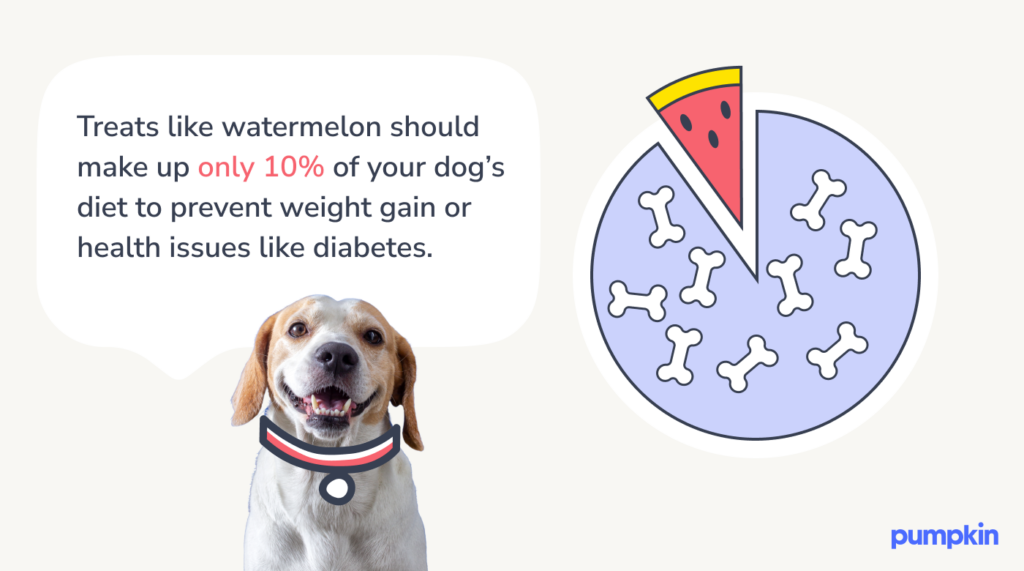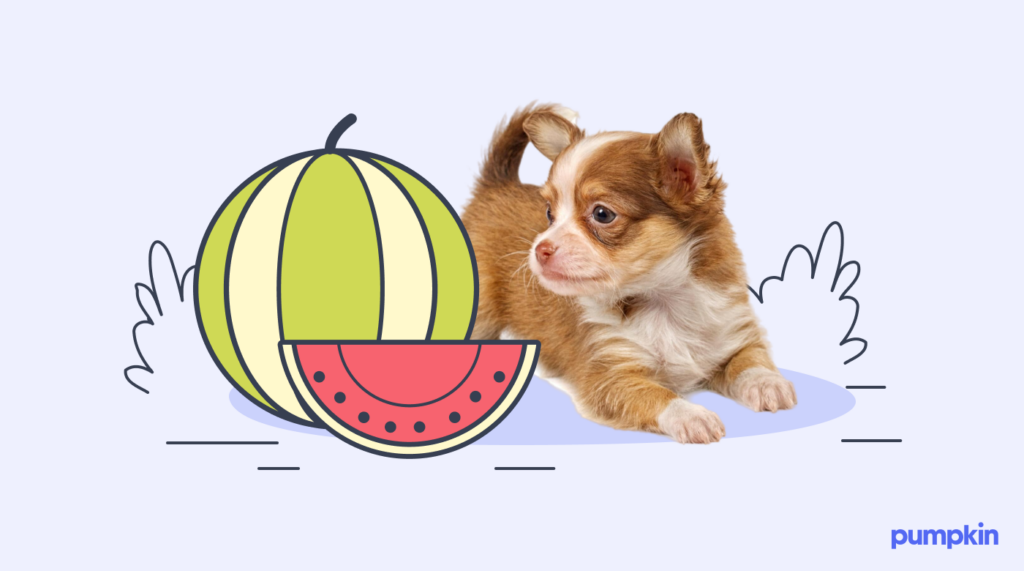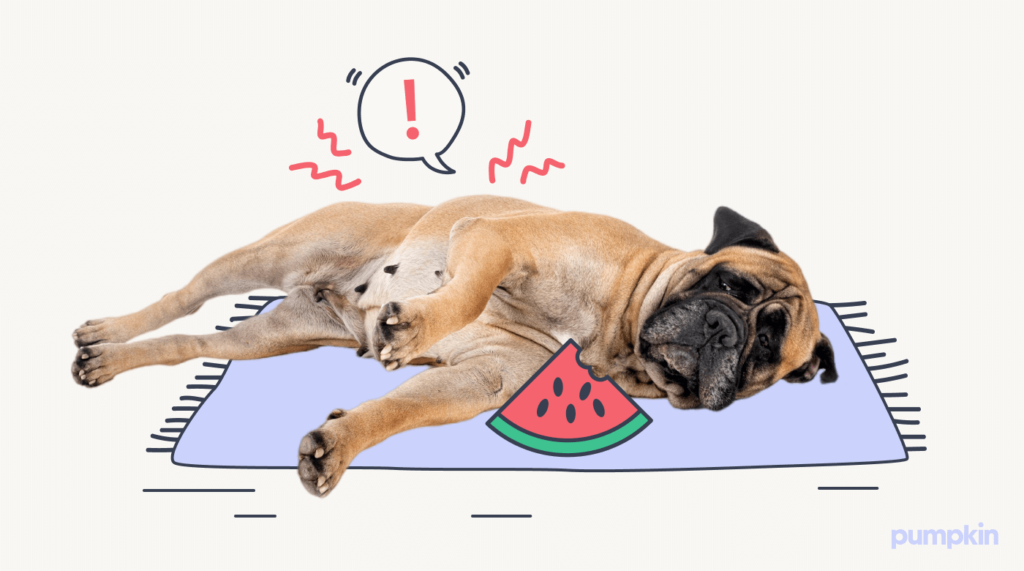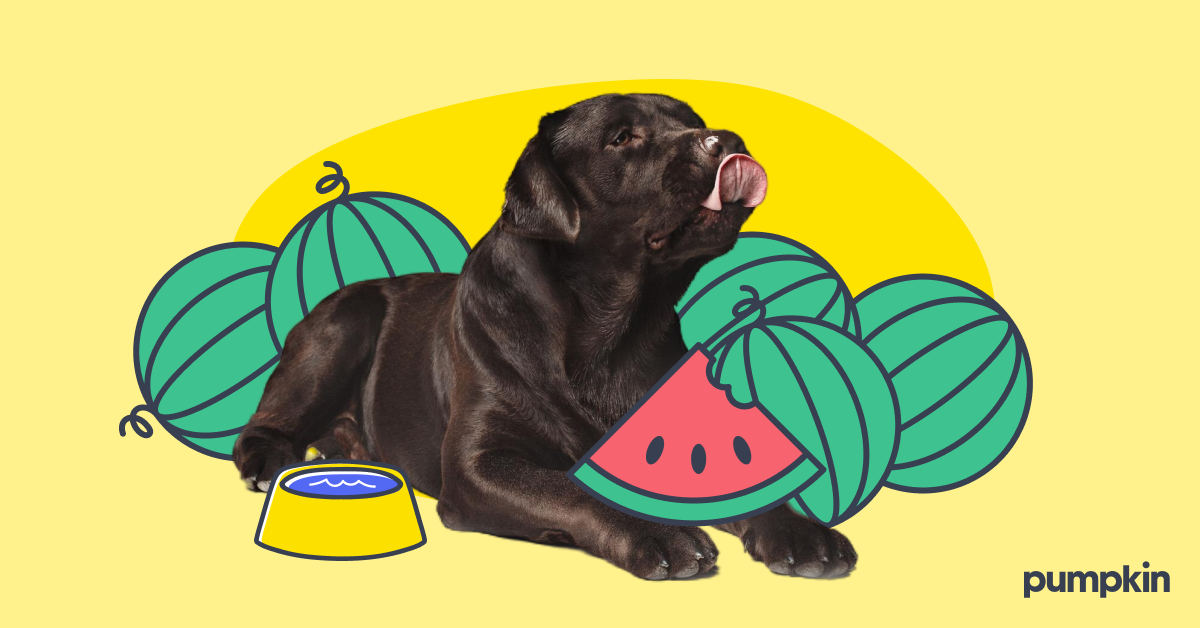Key Points:
- Yes, dogs can eat watermelon, but the seeds and rind should be removed.
- Watermelon offers dogs hydration and vitamins A, B6, and C.
- Overconsumption of watermelon can lead to digestive upset due to high sugar.
It’s a hot summer day, and you’re slicing up fresh watermelon for a tasty snack.
But before you toss a wedge to your pup, it’s important to consider: Can dogs eat watermelon?
The short answer is yes — healthy dogs can eat watermelon as long as it’s specially prepared for them. (And if you want to dive into the long answer with us, read on.) Watermelon is composed of around 90% water and is low in calories, making it a smart snack for both humans and dogs.
This guide will teach you about the benefits of this fresh fruit for your pup, a couple of small risks you should be aware of, and the right amount to share.
Watermelon is safe for most dogs
While regular dog food should make up most of your dog’s diet, an occasional bite of this healthy treat can be beneficial for your pooch. Watermelon is safe for dogs to eat when the rind and seeds are removed and the fruit is cut up into small pieces. Because it contains mostly water, you can use it if you’re looking to sneak extra hydration into your dog’s diet.
Watermelon is also a low-calorie snack, so you don’t have to worry too much about your pup gaining weight. Still, because of the high sugar content, watermelon should be served in moderation.
Nutritional value of watermelon for dogs
Watermelon is mainly water and naturally occurring sugars. In fact, out of 100 grams of watermelon, 91 grams are water.
When deciding how much watermelon is safe for your dog, reference the following nutrition facts alongside your dog’s recommended portion size:
One cup (152 grams) of diced watermelon contains:
- 45.6 calories
- 139 grams of water
- 11 grams of carbohydrates (nine of which are sugars)
A large wedge (approx 286 grams) of watermelon contains:
- 86 calories
- 261 grams of water
- 21.6 grams of carbohydrates (17.7 of which are sugars)
Benefits of watermelon for dogs
Watermelon is filled with antioxidants, fiber, potassium, vitamin C, vitamin A, and lycopene, which may be beneficial for slowing the rate of cancer growth.
Its high fiber content means it won’t spike your dog’s blood sugar. However, if your dog has diabetes, it’s still worth checking with your vet before adding watermelon to their diet.
How much watermelon can my dog eat?

Like all treats, watermelon should make up only 10% of your dog’s diet to avoid unnecessary weight gain.
Depending on your pet’s size and their daily calorie needs, this is how that breaks down:
- Teacup dogs (dogs under 5 pounds): 10-17 calories
- Toy dogs (5 to 12 pounds): 18-40 calories
- Small dogs (13 to 24 pounds): 40-69 calories
- Medium dogs (25 to 59 pounds): 69-131 calories
- Large dogs (60 to 100 pounds): 133-196 calories
Based on the nutritional information above, a good rule of thumb is to give teacup dogs and toy dogs only a couple of small pieces, while small to large dogs can enjoy one cup’s worth or more. Some medium or large dogs could even have a whole wedge to themselves.
Can puppies eat watermelon, too?
Yes, watermelon is safe for puppies to eat, but moderation and proper preparation are still important. A puppy’s daily caloric intake differs from that of an adult dog, so make sure to consider their unique dietary requirements when sharing a portion of the fruit with them.

Also, a puppy’s small size and enthusiasm about everything — two things we adore about our puppies — make them particularly vulnerable to choking. So, here’s an extra reminder to remove the rind and seeds.
Risks of feeding watermelon to dogs
As with all human foods, sharing watermelon with our pets carries some risks. Here are the main ones:
Overfeeding
Even though watermelon is mostly water, when it comes to our dogs, the saying “too much of a good thing” applies. Overfeeding watermelon to your pooch can result in mild to serious health issues, such as:
- Diarrhea
- Constipation
- Upset stomach
- Weight gain
- Diabetes
Intestinal blockages
Dogs can’t adequately digest watermelon rind and the seeds, and both pose risks for intestinal blockages. If your dog has eaten some watermelon seeds or rind by accident, they’ll more than likely be just fine, but monitor their reaction to be safe.

This could cause major health problems for your dog and require an emergency vet visit. And if you don’t already have dog insurance, this could be an expensive trip.
Save yourself the stress — and your dog the sore belly — by only giving them the red flesh of the watermelon to eat.
Pet Pro Tip: If you have a dog that is prone to ‘snacksidents’ – you should consider getting a dog insurance plan as soon as possible. It can help you afford the best care in the future by covering eligible vet bills for digestive illnesses, toxic ingestion, and more.
Choking
Not only can the hard rind of a watermelon be difficult to digest, but it can also give your dog some trouble when they’re chewing and swallowing it. This poses a choking hazard to dogs of all sizes.
So, make sure to remove the rind before giving watermelon to your dog. The light green part of the rind that’s softer than the dark green part is okay for dogs if ingested. The seeds, though small, could also pose a choking hazard for smaller pups. Again, it’s better to be safe and remove them before sharing.
Watermelon allergies in dogs
Though not common, watermelon allergies and intolerances do exist. This is why it’s important to monitor your pup when giving them watermelon — and, really, any new foods to eat — for the first time.
“If your dog experiences loose stool, vomiting, or loss of appetite after eating watermelon, they may have an adverse reaction to watermelon,” said Dr. Sarah Wooten, DVM, in an email with Pumpkin. “Stop giving the watermelon, make sure the symptoms resolve, and talk to your vet before offering any more watermelon.”
Three ways to feed watermelon to your dog
If you want to know how to prepare watermelon for your dog so that they can get all the benefits of this healthy snack without the risk, go for one of these three options:
- Hand-fed pieces: Cut the watermelon into small chunks, remove the seeds and rind, then offer the fresh fruit to your dog.
- Frozen: Freeze chunks (seeds and rind removed) for a cold and hydrating dog treat on a hot day.
- Puréed: Purée the fruit (seeds and rind removed) and put it into ice cube trays to freeze into a hydrating pupsicle.
Alternatives to watermelon
If watermelon isn’t the right option for your dog due to an allergy, the sugar content, or their own preferences, that’s okay. There are still lots of other dog-friendly human snacks for them to try.
Here are some great fruit alternatives to watermelon that are also dog-friendly:
If you’re looking for “people food” alternatives to watermelon that are low in sugar, consider:
- Nuts and nut butters
- Carrots
- Broccoli
- Cheese
- Sweet potatoes
- Green beans
As always, check with your vet before introducing any new human foods to your dog’s diet.
So, can my dog have watermelon?
While watermelon is broadly safe for dogs to eat, you should practice portion control and watch out for any adverse reactions. As long as they tolerate it, watermelon is both a tasty treat for a pup and a great boost to their hydration.
Sometimes, dogs can snatch a bite of food that wasn’t properly prepared for them. In times like this, pet insurance can give pet parents peace of mind. A Pumpkin pet insurance plan can help cover the cost of eligible vet visits in the future, giving you one less thing to worry about.
FAQs
DISCLOSURE




